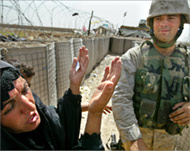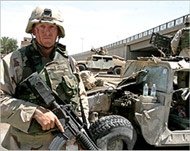A searing portrait of Bush’s America
Filmmaker Michael Moore’s latest effort, Fahrenheit 9/11, has set a higher goal for itself than most films: regime change.

The title, which is a modern take on the classic science-fiction novel Fahrenheit 451 about a degenerate futuristic society, is fitting in more than one way. The Fahrenheit scale, representing a system of temperature measurement unique to the United States and a few other countries, is analogous to the film’s distinctive undertaking: to unseat a president.
In essence, the critical offensive to which Moore subjects President George W Bush is a phenomenon that no one in the rest of the world – particularly the Middle East – can set out to accomplish in their own political environs.
 |
|
Moore believes US democracy is |
Even in the US, however, the film breaks new ground as Moore combines the glitz and glamour of Hollywood entertainment with the harsh realities expected in a rough-edged documentary.
The notion that a two-hour feature film should directly influence voting behaviour is rather unusual, especially when one considers that most of the events it tackles are not uncovered for the first time, but simply an amalgamation of selected news items from the past four years that should be common knowledge for the average politically aware citizen.
In a larger context, Moore‘s film is admittedly a testament to the scarcity of political efficacy in American society, which appears ever critical with such high stakes in the November election.
Democracy in disarray
Despite the evidence of a free and thriving democracy is evident in the film’s very coming to be (though Moore‘s experience with securing distribution tells a different story), from the outset Moore suggests rather dramatically that democracy itself has been threatened by the Bush presidency.
 |
|
Fahrenheit 9/11’s main strength |
Former Vice President Al Gore is shown celebrating a narrow victory that was eventually overturned by election results from the state of Florida – where I viewed the film – and subsequently by a Supreme Court decision that handed the presidency to Bush.
This affair is still fresh in the minds of Florida voters, many of whom accused state officials loyal to Bush of manipulating the outcome of the election by, among other things, disenfranchising tens of thousands of minority voters.
A powerless Gore has no choice but to accept the results, despite protests from African-American members of Congress.
With the memory of such a closely contested election still fresh, Moore presents a nation whose democracy is in crisis, especially on considering the effects of the Bush presidency.
Unfit to govern
Where the film really shines is in its main objective of painting a portrait of the American president. Bush is presented as a man ill-equipped for his position, who stumbled his way into power, while lacking the basic intellect, charm and proper etiquette expected from a statesman.
 |
|
Glitzy Hollywood meets realities |
Through the subtle use of off-air footage of Bush in his natural state, viewers are shocked as they witness his hardly appropriate behavior and often-juvenile mannerisms. An extended scene in which a befuddled Bush continues to read along with a classroom of children upon learning that the US was under attack on September 11 is especially painful to watch, even for his opponents.
Moore follows suit with other members of the Bush administration, presenting them in awkward situations that offer a radically different view of the “War Party”.
|
“Both Republicans Cheryl Steinbeck, an avowed conservative |
Attorney-General John Ashcroft, enforcer of the contentious Patriot Act, is shown singing. Deputy Secretary of Defence Paul Wolfowitz is seen combing his hair before a television interview, using his own saliva to ensure a good look.
By showing the hawks in their natural state, Moore humanises them, but simultaneously commits the audience to reacting to those images with revulsion as their notorious deeds are suddenly given more weight than before.
The Saudi ‘connection’
One of the major pitfalls of this film appears in the first half segment devoted to establishing a perilous relationship between the Bush family and the equally if not more sinister – according to Moore – ruling family of Saudi Arabia and other Saudi elites, including the Bin Ladin family.
It is here that Moore‘s superficial understanding of international politics takes centre-stage, as he frequently uses the Saudi royal family and the Bin Ladin clan interchangeably, at one point even discussing Bush’s relationship with the latter in detail, while exhibiting a series of photographs of Bush with only Saudi officials.
Moreover, the implicit suggestion that the Saudi government is somehow driving the Bush administration’s policies towards the region flies in the face of Washington‘s unprecedented support for Israel as well as strong regional opposition to the invasion of Iraq.
 |
|
The account of Bush-Saudi links |
Ironically, many experts contend that the war did nothing to bolster Saudi Arabia‘s position in the region, but possibly diminished from it by placing the second largest oil reserve in American hands.
Throughout these scenes, Moore is led around by Craig Unger, the author of House of Bush, House of Saud, a scathing attack on the US relationship with the Saudi kingdom. With such a limited perspective, it is clear why Moore takes the stance that he does, though no reason (apart from vague but legitimate human-rights concerns) is ever really given for why such a monolithically menacing view of Saudi Arabia exists.
Indeed, many audience members I spoke with afterwards suggested that the connection was overblown and tenuous at best.
The path to war
Of the many contributing factors of the US-led campaign against Iraq, Moore pays heed to several significant ones in a meticulous and artful manner. He describes with vivid realism the cultural transformation of America to a nation constantly under the gun, where ordinary citizens are treated with suspicion and law-enforcement powers have been greatly expanded to devastating effects.
Moore depicts the culture of fear and paranoia that has continued to grip the nation as a masterful demonstration of control by the Bush administration and subsequently parroted by complicit media unable or unwilling (in the case of Fox News) to ask the tough questions.
 |
|
The film portrays the US soldier |
Fahrenheit continues to earn its title to the extent that the barometer for fear is measured by the multi-coloured terror threat system implemented by the Department of Homeland Security, heightened at strategic times, including the build-up to the war.
Fans of Moore‘s previous films are not disappointed here, as his customary study of corporate power is given special attention with regard to shaping US policy towards Iraq. One energy company executive concedes the catastrophic consequences that the invasion had on Iraq‘s population, but concludes nonchalantly that war is “good for business, bad for the people”.
Many viewers particularly appreciated these elucidations. Fonda Harris, a Florida resident, says, “I’m very happy that someone has given voice to my feelings and frustrations over the false reasons for going to war.
“US foreign policy should reflect American values and it doesn’t. It represents economic interests.”
But while it provides the economic reasons for the Bush administration’s direction, Fahrenheit falls short in postulating any ideological basis for the war, an area where tremendous study has been done and massive amounts of evidence unearthed.
As an administration whose leading figures have openly touted their neo-conservative beliefs, it is a wonder that the term itself is never mentioned, let alone explored.
Eyes wide open
The film’s depth is reserved for its coverage of the Iraq war. For the first time, Americans are exposed to some of the more shocking footage of the death and destruction caused by the US military. Though Arab audiences internalise such images each day, the American media are clearly shown to have neglected the brutalities of war.
|
“I’m very happy that someone has given Fonda Harris, a Florida resident |
In fact, Moore uses footage from Aljazeera and other Arab news networks to provide Americans with a view of war from the other side of the fence. Upon watching one particularly harrowing scene in which an Iraqi woman wails at her family’s loss amidst a pile of rubble and curses those responsible, a friend of mine told me, “Now I really see why they hate us.”
Moore leaves his most thorough analysis for those Americans on the frontlines. The US soldier is presented as both victim and oppressor.
The young men are often the products of debilitating economic conditions and thus vulnerable to aggressive recruitment. In battle, however, they frequently display abusive behaviour against innocent civilians and lack the sensitivity to the local cultural norms to fulfil their mission of winning hearts and minds.
 |
|
The film has broken new ground |
To varying degrees, Fahrenheit appears to advocate change through public awareness.
Lila Lipscomb is the embodiment of this endeavour. We follow her transformation on camera, from a flag-waving supporter of Bush and his decision to go to war, to a teary-eyed mother who has lost her son in Iraq and is forced to contemplate the reason she (along with the rest of the country) finds herself in this tragedy.
An avowed conservative I spoke with after the movie, agrees that these questions are important. “Both Republicans and Democrats need to see this film. There are some really important questions about whether this is the right path to follow and where it is taking us,” said Cheryl Steinbeck.
President Bush, however, doesn’t seem to be taking that advice. When recently asked whether the president would see Fahrenheit 9/11, White House Communications Director Dan Bartlett suggested that he would rather see Shrek, the computer-animated children’s film starring the popular green ogre set in a fairytale world.
Moore might find this fitting, considering that Bush’s fairytale might soon come to an end.